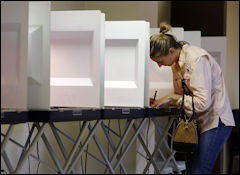
Yes, Virginia, illegal voting by non-citizens does occur here. The practice may be widespread…. or not. We don’t know for sure. Photo credit: Virginian-Pilot.
President-elect Donald Trump blasted out another of his notorious tweets three days ago, claiming that he would have won a majority of votes in the 2016 election were it not for “serious voter fraud” in Virginia and other states. “Why isn’t the media reporting on this?” he asked. “Serious bias – big problem!”
National TV networks and other prestigious media outlets counter-attacked, describing the tweets as “baseless” and backed by “zero evidence.” NPR traced his “unfounded claim” to the conspiracy-minded Info Wars website and radio show, which used “flawed evidence” in reporting that three million people voted illegally. The sum total of the reporting has been to imply that not only is Trump’s claim without merit but that voting fraud occurs on such an insignificant scale as to be electorally meaningless.
Trump’s insistence that he would have won the popular vote had two million people not voted illegally is a huuuge stretch. However, the national media has not distinguished itself in debunking the charge. Pillars of the news establishment have abandoned any pretense of objectivity. Indeed, their unhinged reaction lends credence to Trump’s charge that they are guilty of serious bias.
The fact is, there is credible evidence that illegal voting does occur on a fairly large scale. Media pundits quoting other media pundits in an endless loop does not constitute proof otherwise.
The first body of evidence comes from Jesse T. Richman, Gulshan A. Chattha and David C. Earnest, professors at Old Dominion University and George Mason University. Writing in a 2014 edition of Electoral Studies, they drew upon data from an internet-based survey compiled as part of the 2008 and 2010 Cooperative Congressional Election Studies. The survey sample was robust: 32,800 in 2008 and 54,00 in 2010. Unlike other voter surveys, this study did not filter out the responses of non-citizens.
Extrapolating from the survey results, the authors concluded that “the proportion of non-citizens who voted in 2008 was less than fifteen percent, but significantly greater than zero.” In 2010, “more than three percent of non-citizens reported voting.”
Given statistical margins of error and other uncertainties, there is no way to quantify an exact number of non-citizen voters. The authors give a range of between 33,000 nationally on the low end and 2.8 million on the high end. (I’m not certain where Trump got his data, but he might well have seized upon the authors’ high-end estimate. Using that number without stating the caveats and qualifiers might justly be characterized as reckless. But it is not “baseless.”)
Despite the uncertainties, Richman, Chattha and Earnest said that non-citizen votes could have influenced some electoral outcomes in 2008. For instance, presidential election results in North Carolina were so close that a mere 5.1% turnout of non-citizens could have given Barack Obama his 14,177-vote margin of victory. By contrast, Obama’s margin in Virginia was so wide that it would have required 85% of non-citizens voting — an improbably large percentage — to have handed him a victory.
A second body of evidence comes from a 2016 study by the Public Interest Legal Foundation. PILF documented — as in, it provided documentary evidence, not statistical inference — of 1,046 non-citizens registered to vote in Virginia who were subsequently removed from the voter rolls. The authors also documented that these non-citizens accounted for nearly 200 ballots cast.
The numbers sound negligible but they were based on responses from eight jurisdictions accounting for only 16% of the state’s population. Extrapolating statewide, the number of ballots cast could well have exceeded 1,200 and the number of improper registrations 6,000. Extrapolating nationally, we could be talking 50,000 votes and 240,000 registrations.
Admittedly, there are dangers in extrapolating those numbers. We don’t know how representative those eight Virginia jurisdictions are of national patterns. On the other hand, one can argue that these numbers under-represent the extent of illegal voting because they reflect only non-citizens who were identified and removed from voter rolls. The figures do not include non-citizens whose illegal registrations were never caught.
All studies of electoral fraud are based on imperfect data and assumptions that can be challenged. There is a fuzzy halo of uncertainty around any estimate. But it is patently wrong to say that there is “zero evidence” that wide-scale illegal voting is occurring.
Tweeting claims casually scooped up from the Internet does not project the gravitas we expect of our president-elect. But shrill denunciations emanating from national news organizations are no more credible. The truth is, illegal voting does occur but it’s impossible to pinpoint exactly how much. Unless Trump and the media do better, the public will learn to trust neither.
Update: Turns out that Jesse Richman has opined on this very question. His verdict: There is no way that non-citizen votes could account for Clinton’s winning margin in the popular vote. But his commentary suggests that he believes voting by non-citizens still occurs.


